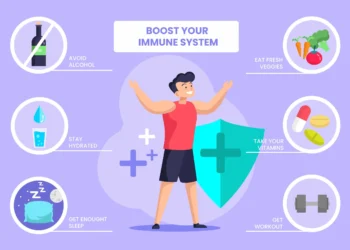Milk has been a human staple food for thousands of years, valued for its nutritional potency and diversity. Milk, one of nature’s most complete foods, offers you all the nutrients necessary for health and well-being. Milk has numerous benefits from strengthening bones to promoting the development of muscles, even boosting the immune system. This article explores milk’s nutritional content, health benefits, and myths surrounding this powerful beverage.
Table of Contents
The Nutritional Profile of Milk
Milk is a nutritious drink that is rich in vitamins, minerals, proteins and fats. One cup (240 ml) of whole milk contains roughly:
- 150 Calories
- 8 grams Protein
- 8 grams Fat (including saturated and unsaturated fats)
- 12 grams Carbohydrates (mostly lactose, the natural sugar in milk)
- 276 mg Calcium (28% of the recommended daily intake, or RDI)
- 2.4 mcg Vitamin D (15% of the RDI)
- 1.1 mcg Vitamin B12 (46% of the RDI)
- 322 mg Potassium (9% of the RDI)
- 222 mg Phosphorus (22% of the RDI)
- Magnesium, zinc, and riboflavin (Vitamin B2) are present in good amounts.
Milk’s macronutrient profile is perfect for development, healing, and energy. And it is rich in pure protein, all the nine amino acids that your body needs.
Health Benefits of Milk
1. Bone Health and Strength
The most famous effect of milk is its role in bone health. Milk contains calcium, phosphorus, and vitamin D which are all needed to form and maintain healthy bones. Calcium is the major mineral of bones, and milk has vitamin D which promotes absorption. These two attributes make milk a valuable partner in preventing osteoporosis, which leads to weak, brittle bones, especially in older people.
2. Muscle Growth and Recovery
Dairy is a good source of protein for the repair and development of muscles. Milk protein consists of whey and casein which is beneficial in different ways. Whey protein can be rapidly absorbed in the body, and it’s ideal for post-workout recovery. Casein, however, breaks down much slower, so it releases long-term amino acids to help repair muscles. Additionally, milk is rich in electrolytes like potassium and sodium, which keep you hydrated and avoid muscle cramps.
3. Supports Weight Management
There is a myth about milk causing you to gain weight, but researches indicate it can help you with weight management. Because milk is so protein-rich, it helps us feel full, thereby lowering our calorie intake. Furthermore, calcium in milk has also been shown to aid in fat metabolism and may support weight loss or weight maintenance.
4. Boosts Immune Function
Milk is rich in immune-supportive nutrients such as vitamin A, vitamin D, zinc, and selenium. Vitamin D, in particular, controls the immune system and prevents infection. Zinc and selenium also help the body fight off infections and boost the immune system.
5. Improves Heart Health
Whole milk contains saturated fats, which have been associated with heart disease, but recent research shows that saturated fats are less connected to heart health. Milk also contains potassium, a mineral that helps keep blood pressure under control and counteracts sodium. Furthermore, fermented dairy products such as yoghurt and kefir (made from milk) have been shown to improve cardiovascular health.
6. Promotes Healthy Skin
The vitamins present in milk, including vitamin A and biotin, promote good skin. Vitamin A stimulates new skin cell production and helps maintain skin elasticity, while biotin hydrates the skin and minimizes dryness. The lactic acid in milk has exfoliating properties, which is why milk has been used in beauty treatments for thousands of years.
Milk for Different Life Stages
Infants and Children
Breastmilk is the perfect nourishment for newborns, giving them all the nutrients they need to grow and develop. Cow’s milk is then a staple of a child’s diet once weaned, providing the calcium, protein and vitamins that are vital to developing bones and muscles.
Adolescents
Bone growth happens most rapidly during the adolescent years when the body constructs most of its bone mass. The calcium and vitamin D in milk have become crucial dietary components during these years, providing the basis for long-term bone health.
Adults
Even for adults, milk remains a convenient and nutritious source of daily calcium and protein. Drinking milk regularly can keep your muscle mass and bone density healthy, preventing the progression of age-related disorders such as sarcopenia and osteoporosis.
Seniors
As we get older, our body’s absorption of calcium becomes weaker, and having calcium-rich foods such as milk regularly is a crucial part of our diet. Milk can also counter the loss of muscles and nourish the general health of the older person.
Addressing Lactose Intolerance and Alternatives
Though milk is undoubtedly a healthy and rich food, unfortunately, some of us can’t drink it because of lactose intolerance (which means the body doesn’t have the enzyme lactase to digest lactose). When you eat dairy products, if you face bloating, gas, and diarrhoea problems then these are signs of lactose intolerance.
For lactose-intolerant individuals, the following options are available:
- Lactose-Free Milk: Whole milk with the lactose removed or broken down for easier digestion.
- Plant-Based Milk: Almond, soy, oat and coconut milk are some of the popular alternatives, but they have a lot more to offer than cow’s milk. Enhanced versions often come with added calcium and vitamin D to stimulate the health effects of dairy milk.
- Fermented Dairy Products: Yogurt and kefir are typically easier to digest if you are not too sensitive to lactose because fermentation breaks down some of the lactose.
Common Myths About Milk
Myth 1: Milk Causes Inflammation
Some people think that milk and dairy foods cause inflammation. Yet studies indicate that milk is neutral or even anti-inflammatory for the majority of people. The fermented dairy products in particular have been associated with reduced markers of inflammation.
Myth 2: Milk Is Only for Children
We know milk is a vital component for developing children, its nutritive content is essential for people of any age group. Milk helps to maintain bone density, muscle growth and a balanced diet at any age.
Myth 3: All Dairy Makes You Fat
This myth arises from the false belief that all fats are evil. In fact, milk fats provide crucial fatty acids and energy. Low-fat or skim milk can also cut calories without compromising the nutrition of people who are concerned about weight loss.
Sustainable Dairy Practices
As environmental sustainability issues rise, the role of dairy farming is now under question by most. Fortunately, sustainable dairy is becoming more mainstream. Precision farming, enhanced feed efficiency and renewable energy technologies are all making dairy production less carbon-intensive. In addition, plant-based milk alternatives provide options for people who are environmentally concerned.
Final Words
Milk is a nutritional energy house that offers a variety of health benefits. This mineral-rich combination of calcium, protein, vitamins, and minerals aids in maintaining healthy bones, strong muscles, and a strong immune system. Even though some of us might have to find alternatives due to lactose intolerance or just our individual tastes, milk is still a valuable part of a healthy diet for any age group. And by learning about its nutrition and dispelling myths, we can continue to appreciate milk’s role in health and well-being.
















